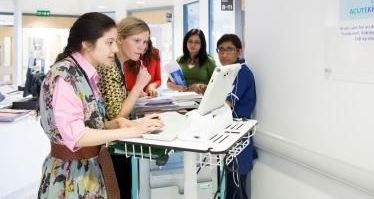 Millions of patients can expect improved care for cancer and heart disease – combining cutting edge technology and expertise with excellent local care to speed recovery – as part of a radical reorganisation given the go-ahead today.
Millions of patients can expect improved care for cancer and heart disease – combining cutting edge technology and expertise with excellent local care to speed recovery – as part of a radical reorganisation given the go-ahead today.
The Royal Free is part of a network of trusts across north and east London and west Essex that are providing specialist cancer care for patients.
Under the new system, the trust will become a centre for the specialist treatment of kidney cancer. The Royal Free will also work within a system of hospitals including University College Hospital, The Royal London, St Bartholomew’s and Queen’s in Romford, to provide specialist treatment of five types of cancer – brain, prostate and bladder, head and neck, oesophago-gastric and blood cancers.
The vast majority of other cancer services, including radiotherapy and chemotherapy for these and other cancers, will still be available in local hospitals, as they are at present.
St Bartholomew’s Hospital will become the centre for specialist treatment of heart disease, including the largest cardiovascular surgery centre in England, the Bart’s Heart Centre. The new centre will perform more heart MRI and CT scans than any other centre in the world.
Cancer and cardiovascular disease cause nearly two thirds of early deaths in England and Wales. Covering a population of three million people across north and east London and west Essex, the new system could save over 1,000 lives a year by giving patients world class care at every stage – from prevention and diagnosis, through to treatment and beyond. In addition, the new structure will deliver savings of over £94million and will benefit the UK economy through the development of globally competitive research into cancer and heart disease.
Evidence shows that dedicated specialist centres, treating a high volume of patients, staffed by expert teams and equipped with the latest technology and research capability save lives and reduce complications. This has been the result of the creation of specialist stroke centres in London four years ago, which have saved more than 400 lives and driven improvements in outcomes and care.
Based on a case for change put forward by heart disease and cancer doctors and nurses, new centres at St Bartholomew’s Hospital and University College Hospital respectively will act as ‘hubs’ within a comprehensive network of care including local hospitals, GPs and other community services. This integrated system will focus on the needs of patients, providing the safest care and a more highly skilled workforce available 24/7, whilst ensuring people are still able to receive the majority of their care locally – all aimed at giving patients the best outcomes and a better experience of their care. It will also ensure services are sustainable for the future.
Anne Rainsberry, regional director of NHS England London, said: “This programme is a radical new way of delivering care and a once-in-a-lifetime opportunity to improve services for today’s patients and future generations. These ‘centres of excellence’ should also position London as a leader in research into cardiovascular disease and cancer, attracting some of the brightest and best clinicians and academics to work and study in the UK.
“We know that when people need specialist care, they should be treated in centres with the most highly trained and experienced staff and best facilities. However, people also need to receive high quality care close to home too and this new approach will ensure they get that at every stage.”
Professor Sir David Fish, managing director of UCLPartners, of which the Royal Free is a partner, said: “It is unacceptable that so many lives across are lost across our population every year through inadequate prevention, late diagnosis and fragmentation of services for cancer and cardiovascular disease. Doctors, nurses and patients from hospitals and GP practices across the region have been working relentlessly to change this. Through their efforts, the specialist centres will be embedded in joined-up systems of care that together will drive up standards of care, teaching and research. This will deliver safer care, better outcomes – saving lives and reducing complications – and improve experience of people with cancer and heart disease. This is what patients deserve and it can’t come too soon.”
Now approved, these new arrangements will be delivered progressively over the next four years, although the Royal Free has already begun to roll out its specialist kidney cancer services.
 Translate
Translate